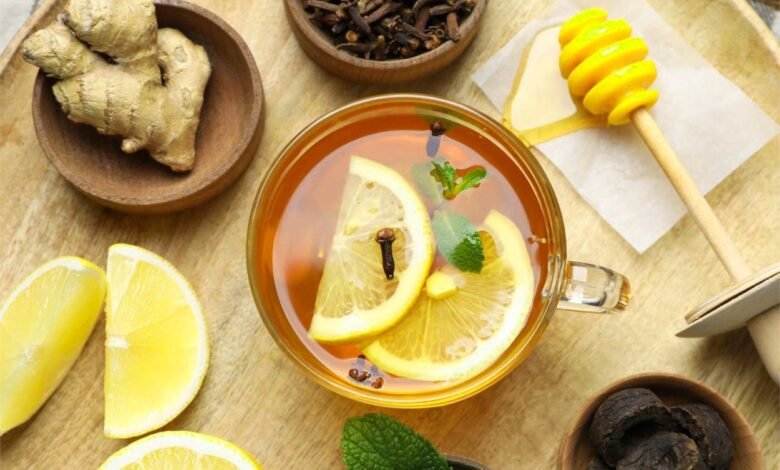11 Best Natural Remedies for Cold and Flu

Cold and flu seasons can be challenging, with symptoms like congestion, sore throat, and fatigue hindering our daily activities. While conventional medicine provides options for symptom relief, there are natural remedies that can complement these treatments and promote faster recovery. In this article, we will explore the 11 best natural remedies for cold and flu that you can easily incorporate into your wellness routine.
Read More: Essential Flu Fighters Products for Good Health 2023
Ginger: A powerful natural remedy
Ginger has been used for centuries for its medicinal properties, especially in treating cold and flu symptoms. Its potent anti-inflammatory and antioxidant properties help alleviate congestion, soothe a sore throat, and reduce coughing. You can consume ginger by making ginger tea, adding it to soups or stir-fries, or even chewing on a small piece.
Honey: Nature’s sweet remedy
Honey is not only delicious but also has antibacterial and antiviral properties that can help combat cold and flu viruses. Its soothing effect on the throat makes it an excellent natural cough suppressant. You can mix honey with warm water or herbal teas, or create homemade remedies by combining it with lemon and ginger.
Garlic: The immune booster
Garlic is a powerful immune booster that can effectively fight off cold and flu viruses. It contains a compound called allicin, which has antiviral and antibacterial properties. Consuming garlic raw or cooked can help alleviate symptoms and speed up recovery. You can add it to your meals or make garlic-infused honey for added benefits.
Echinacea: Herbal support for the immune system
Echinacea is a popular herb known for its immune-boosting properties. It can help reduce the duration and severity of cold and flu symptoms. Echinacea is available in various forms such as capsules, extracts, and teas. It’s essential to follow the recommended dosage instructions for optimal results.
Vitamin C: The defender of health
Vitamin C plays a crucial role in supporting the immune system and fighting off cold and flu viruses. It can help reduce the duration and severity of symptoms. Citrus fruits, strawberries, kiwi, and bell peppers are excellent sources of vitamin C. Additionally, you can consider vitamin C supplements to ensure adequate intake.
Turmeric: Golden spice for wellness
Turmeric contains a compound called curcumin, which has strong anti-inflammatory and antioxidant properties. It can help alleviate symptoms such as sore throat, coughing, and congestion. Incorporating turmeric into your diet by adding it to curries, smoothies, or golden milk can provide relief during cold and flu.
Elderberry: The flu-fighting fruit
Elderberry is a natural remedy widely used for its antiviral effects against influenza viruses. It can help reduce the severity and duration of flu symptoms. Elderberry syrup, gummies, or tea are popular options for incorporating this immune-boosting fruit into your cold and flu routine.
Peppermint: Cooling relief for congestion
Peppermint contains menthol, a compound that can help relieve congestion and clear nasal passages. You can drink peppermint tea, inhale peppermint oil, or apply diluted peppermint oil topically to your chest for congestion relief during cold and flu.
Chamomile: Soothing comfort for sickness
Chamomile has calming properties that can help alleviate symptoms such as fever, headache, and insomnia during illness. Drinking chamomile tea before bedtime can promote relaxation and provide relief for cold and flu symptoms.
Chicken Soup: Grandma’s secret weapon
Chicken soup has been a go-to remedy for generations when it comes to colds and flu. It provides hydration, warmth, and essential nutrients that support the immune system. You can prepare homemade chicken soup using bone broth, vegetables, and herbs for a nourishing and comforting meal during illness.
Essential oils: Aromatic healing
Certain essential oils have antimicrobial properties that can help fight off cold and flu viruses. Eucalyptus, tea tree, and lavender are popular choices for their respiratory benefits. You can use essential oils by inhaling them through steam inhalation or using a diffuser.
It’s important to note that these natural remedies are meant to complement conventional treatments and not replace medical advice. If your symptoms persist or worsen, it’s crucial to consult a healthcare professional.
Rest and hydration: Crucial for recovery
While incorporating natural remedies, it’s vital to prioritize rest and hydration. Getting adequate sleep and drinking plenty of fluids such as water, herbal teas, and warm broths can help your body recover faster. Resting allows your immune system to work efficiently and fight off the cold or flu virus effectively.
Prevention is better than cure
Preventing colds and flu is always preferable to dealing with the symptoms. To reduce your chances of falling ill, it’s essential to maintain good hygiene practices such as washing your hands regularly, avoiding close contact with sick individuals, and maintaining a healthy lifestyle with a balanced diet and regular exercise. Supporting your immune system through healthy habits can minimize the risk of catching a cold or flu.
Conclusion
Incorporating natural remedies into your cold and flu routine can provide relief from symptoms and support your overall well-being. From ginger and honey to turmeric and essential oils, these remedies offer a holistic approach to combatting cold and flu viruses. Remember to prioritize rest, hydration, and prevention strategies for optimal recovery and staying healthy.
Read More: The Verdict: Could You Ever “Boost” Your Immune System?
FAQs
Q1. Are natural remedies safe for everyone?
Natural remedies are generally safe for most individuals. However, it’s essential to consider any allergies or specific health conditions you may have. If you’re uncertain, consult a healthcare professional before using any natural remedies.
Q2. Can I use these remedies for children?
Some natural remedies may not be suitable for young children or infants. It’s best to consult with a pediatrician or healthcare provider before administering any natural remedies to children.
Q3. How long should I try these remedies before seeking medical attention?
If your symptoms persist or worsen after trying natural remedies, it’s advisable to seek medical attention. Natural remedies can provide relief for mild symptoms, but professional medical advice is necessary for severe or prolonged illness.
Q4. Can I combine different natural remedies together?
Combining natural remedies can be beneficial, but it’s important to research potential interactions and follow recommended dosages. If you’re unsure, consult a healthcare professional for guidance.
Q5. Are these natural remedies scientifically proven?
Many natural remedies have scientific evidence supporting their efficacy in relieving cold and flu symptoms. However, it’s always recommended to stay informed and refer to reputable sources for the latest research and studies.







